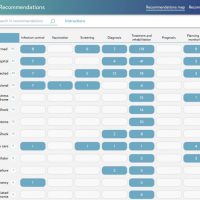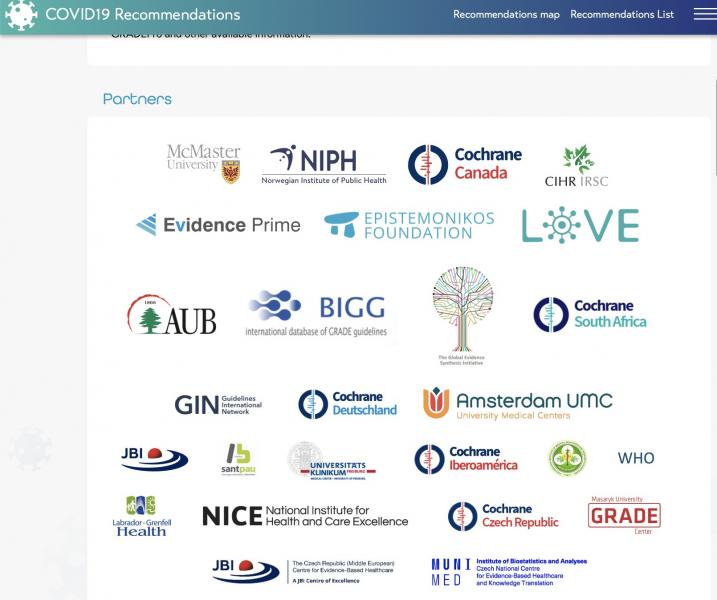
The COVID-19 Recommendations Map is out and offering policymakers, healthcare practitioners, researchers and the general public - anywhere in the world - a comprehensive catalog of critically appraised evidence.
This global collaborative effort from Cochrane Canada, McMaster University’s WHO Collaborating Centre for Infectious Diseases and an international consortium of researchers spanning six continents have developed this living map of the latest evidence-based recommendations for the prevention and care of COVID-19, and we are very proud to be one of the partners of this project.
Press release:
As the COVID-19 pandemic continues to upend everyday life and weaken healthcare systems worldwide, the scientific community finds itself in a race against time to track and control the spread of infection.
Researchers from all disciplines continue to act swiftly, teaming up in many cases to forge innovative and far-reaching partnerships to advance the collective understanding of the SARS-CoV-2 virus that causes COVID-19.
“When faced with a public health crisis of this magnitude, it is essential that we join forces with our scientific colleagues to learn from their experiences and gain from their perspectives,” said Dr. Holger Schünemann, director of Cochrane Canada and the Michael G. DeGroote Cochrane Canada Centre. “It is through these unique partnerships that we are able to contribute to the growing body of evidence in meaningful and impactful ways.”
But what is more important, he added, “is getting the evidence into the hands of decision-makers when they need it most.”
To this end, Schünemann is leading a global collaborative effort with members of Cochrane Canada, McMaster University’s WHO Collaborating Centre for Infectious Diseases, Research Methods and Recommendations, and an international consortium of researchers spanning six continents to develop a living map of the latest evidence-based recommendations for the prevention and care of COVID-19.
The map, which will roll out in phases beginning in December 2020, builds on the team’s prior work in co-developing WHO’s database of recommendations for TB prevention and care. Leveraging the reach of a freely accessible digital platform, the map will provide decision-makers, including policymakers, healthcare practitioners, researchers and the general public, anywhere in the world with a comprehensive catalogue of critically appraised evidence in both French and English.
“During a global pandemic, it is critical that we make recommendations from high-quality guidelines accessible and readily available,” said Dr. Tamara Lotfi, a research associate and project coordinator with McMaster University’s WHO Collaborating Centre for Infectious Diseases, Research Methods and Recommendations.
Lotfi, who plays a central role in the ongoing development of the map, added that the final version will allow users to fully contextualize their search queries, enabling them to make timely and informed decisions at a local, national, or international level.
“They simply need to define the population and intervention of interest to explore the recommendations that best fit their needs.”
All contextualized recommendations will be searchable and shareable, accelerating the availability of new evidence to support and advance implementation and research efforts in Canada and around the world, including low- and middle-income countries (LMICs).
COVID-19 has inflicted a heavy toll on resource-constrained LMIC health systems, underscoring the critical need for improved uptake of evidence into policy and practice, said Dr. Joseph Mathew, a paediatrician with India’s Post Graduate Institute of Medical Education & Research and a collaborator on the project.
“The fast evolving COVID-19 pandemic has thrown up the challenge of rapidly developing, appraising, disseminating and updating multiple guidelines. To meet this challenge, the international team we have assembled will provide evidence-based recommendations that can be accessed by anyone and applied in virtually any setting across the globe.”
Supporting healthcare decision-making in Canada and around the world, especially when time is of the essence, is the primary goal of Cochrane Canada and its many partners on this project, said Cochrane Canada’s Managing Director, Dr. Adrienne Stevens.
“Collectively, we have mobilized quickly to get this work underway. Our hope is that by providing access to these recommendations and their underlying evidence, we are reducing waste in research by capitalizing on efforts already put forth. Knowing what exists can also help inform decisions on what additional guidelines should be undertaken, effectively steering the use of research dollars on COVID-19.”
Funding for the living map was provided by the Canadian Institutes of Health Research (CIHR).
Press contact: Joel Tiller, Communications officer, Cochrane Canada, tillej1@mcmaster.ca
Read the short report about this initiative in the Cochrane Library Supplement.
Partners:

Find out more at cochrane.org and canada.cochrane.org
About Cochrane
Cochrane is for anyone interested in using high-quality information to make health decisions. Whether you are a doctor or nurse, patient or carer, researcher or funder, Cochrane evidence provides a powerful tool to enhance your healthcare knowledge and decision-making.
